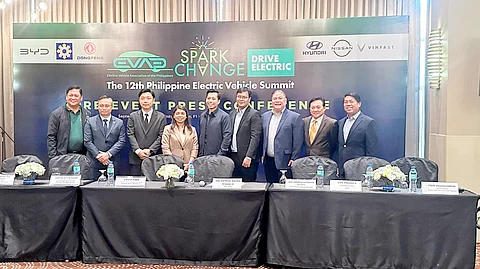
- NEWS
- the EDIT
- COMMENTARY
- BUSINESS
- LIFE
- SHOW
- ACTION
- GLOBAL GOALS
- SNAPS
- DYARYO TIRADA
- MORE

More Filipino car owners are switching to electric vehicles (EVs). Based on annual data from Statista, 10,602 EVs were actually sold in the country in 2023. That is almost tenfold the actual EV sales of 1,072 in 2022.
This can still be attributed to the implementation of the Republic Act 11697 or the Electric Vehicle Industry Development Act (EVIDA) Law, which was enacted in May 2022, with enforcement of rules and regulations taking effect months after.
“We are commending the government for aggressively pushing for a wider adoption of EVs nationwide,” said Edmund Araga, president of the Electric Vehicle Association of the Philippines (EVAP), a private-sector organization that has been espousing the advancement and wide use of EVs in the country since 2009.
“President Ferdinand ‘Bong Bong’ Marcos Jr.’s administration is clearly recognizing the long-term benefits of EV use, citing in many instances its importance in achieving a greener and more sustainable economy in the long run. Earlier this year, he even mandated various government agencies to expedite the implementation of action plans and strategies to further strengthen the EV industry,” he added.
Inter-agency collaboration
In 2023, EVIDA Law paved the way for the Comprehensive Roadmap for the Electric Vehicle Industry (CREVI), a national development plan that is further pushing the goals of the EV industry through focusing on four thrusts — sale of EVs and installation of charging stations, research and development, manufacturing, and human resources development.
CREVI facilitates annual work plans that facilitate collaboration through aligned policies of several government agencies — the Department of Energy (DoE), the Department of Trade and Industry, Land Transportation Office, the Department of Science and Technology, Technical Education and Skills Development Authority, the Department of the Interior and Local Government, the Metropolitan Manila Development Authority and the Office of the President.
Meanwhile, the National Economic and Development Authority in May approved the extension of temporary zero-tariff rate on fully electric vehicles and some hybrid cars, plug-in hybrid e-jeepneys and buses, and battery e-tricycles, among others. This move will assure no tariff on enlisted types of EVs until 2028 — saving about 20 percent to 30 percent on import duties. This will logically further drive sales of EVs.
President Marcos has also ordered a faster integration of EVs into public agencies’ vehicle fleet. He has reiterated that up to 10 percent of government vehicles nationwide should be EVs, a commitment stated in the EVIDA Law.
On the right track
“With all the support from the private and public sectors, the EV industry in the Philippines is truly on the right track. EVAP is upholding its forecast of about 6.6 million EVs sold in the country by 2030,” Araga said.
As of June 2024, sales of EVs domestically have so far reached 2,071, based on consolidated industry data. Araga explained that there is nothing to worry about the figure as historically, EV sales significantly increase from September to December.
“Big car brands have also introduced their own EVs, plus many EV brands from China, Japan, and other countries are aggressively marketing their offers. The intensifying competition is making EVs more attractive for Filipino car buyers as price tags go lower, more charging stations open, and enticing perks like exemption from number coding schemes continue,” Araga concluded.
To be know more about the latest EVs available and listen to productive industry discussions, drop by the 12th Philippine Electric Vehicle Summit at the SMX Convention Center Manila in Pasay City from 24 to 26 October. PEVS is the biggest annual exhibition and conference with exclusive focus on EVs, batteries, and other EV components. With the theme “Spark Change, Drive Electric,” PEVS 2024 aims to ignite the transformative shift in eco-friendly and sustainable transportation.
Visit www.evap.com.ph and/or www.evap.com.ph/summit to learn more.
